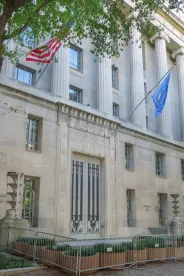Over four years after warning human resource professionals that agreements between competitors not to solicit each other’s employees—known as “no-poach” agreements—could result in criminal prosecution under antitrust laws, the U.S. Department of Justice Antitrust Division (DOJ) recently issued its first such indictment of its kind.
The DOJ’s 2016 Guidance for Human Resources Professionals delivered a stern reminder of the antitrust risks associated with anti-competitive agreements affecting labor markets, specifically wage-fixing and no-poach agreements between competitors that are not reasonably necessary to a broader legitimate collaboration (so-called “naked” agreements). The DOJ warned that it intended to proceed criminally against employers that entered into agreements of this type, explaining that “[t]hese types of agreements eliminate competition in the same irredeemable way as agreements to fix product prices or allocate customers, which have traditionally been criminally investigated and prosecuted as hardcore cartel conduct.” The agency, however, recognized that non-solicitation and other agreements impacting employees may be appropriate when necessary to a larger collaboration between employers, such as a joint venture for shared facilities.
The Guidance arose from a series of antitrust cases against Silicon Valley tech giants. In 2010, the DOJ sued Adobe, Apple, Google, Intel and Pixar over alleged agreements not to “cold call” each other’s highly-skilled employees. This, according to the DOJ, unlawfully restrained competition in the labor market. The parties entered into a settlement with the DOJ in 2011 that enjoined them from entering into agreements not to solicit, cold call, recruit or otherwise compete for employees absent specified legitimate justifications. That same year, employees of these and other companies brought a class action lawsuit on behalf of more than 64,000 employees, alleging that the companies had conspired to depress wages by refraining from poaching one another’s highly-skilled employees, resulting in civil settlements in the tens to hundreds of millions of dollars.
Despite the strong warning to employers in 2016, years passed without the DOJ bringing criminal charges based on a no-poach agreement. That changed on Jan. 5, 2021, when the DOJ brought criminal charges against an outpatient medical facility in United States v. Surgical Care Affiliates, LLC and Scai Holdings, LLC. In the indictment, the DOJ alleges that Surgical Care Affiliates and its successor Scai (collectively, SCA) entered into “gentlemen’s agreements” with at least two different companies not to poach each other’s senior-level employees. The indictment cites numerous emails between human resource representatives and executives of SCA and the other two companies (identified only as Company A and Company B) specifically acknowledging the agreement and discussing several candidates who should not be approached or recruited because of the agreement.
The indictment alleges that the no-poach agreement was effectuated and enforced in several ways. SCA contacted recruiting agencies and instructed them not to solicit or contact senior-level employees of Companies A and B. SCA and the other companies also “monitored compliance . . . by requiring senior-level employees . . . who applied to the other company to notify their current employer that they were seeking other employment in order for their applications to be considered.” Finally, the companies agreed to, and did, alert each other when one of their employees applied for or inquired about employment at the other.
The conduct alleged in the SCA indictment involves a flagrant agreement not to solicit competitors’ employees. The DOJ obtained emails acknowledging the agreement and illustrating SCA and the other companies were abiding by it. Hence, the indictment confirms federal antitrust enforcers’ willingness, in the right case, to pursue criminal charges for anti-competitive agreements impacting labor markets. The DOJ and Federal Trade Commission also recently reinforced their willingness to take a hardline approach on naked agreements between employers in a joint statement addressing anticompetitive employment practices during the 2019 novel coronavirus (COVID-19) pandemic, discussed in an April update.
While it remains to be seen whether the SCA indictment is an outlier—the result of particularly egregious conduct—employers should take seriously both the criminal and civil consequences of agreements that limit competition for employees, fix wages or otherwise unreasonably restrain competition in labor markets. Companies also should consult with employment and antitrust counsel before reaching agreements with competitors that may impact wages, benefits, hiring, retention or working conditions of employees.






 />i
/>i

